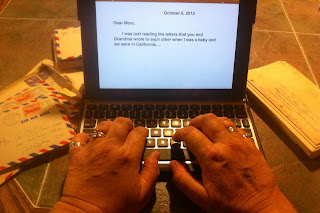 |
| Sally Solara, in her raincoat |
We also put car covers on our two convertibles. The more elderly (and most concerning) is our 63 VW. But we have recently acquired Sally Solara, who now has a raincoat of her own.
But when you have finally done all that you can to prepare for the hurricane, it is pretty boring to sit in the house listening to the wind blowing figuratively about your ears, while the rain is coming down at a 45-degree angle. What can you say about this hurricane? Much has already been said on all your local news stations about the fearsomeness of "Frankenstorm."
But from a personal standpoint, wind, rain, gee I hope the roof doesn’t blow off – and you’re done.
Nothing would do but for us to put on our boots and raincoats, and venture outside with our camera, because we needed to make the story personal. Being at the moment snug inside my house, and content to have hot water and electricity, I tried convincing Eric that he should just go outside and take some random pictures. But he thought we should do this “together”. Eventually, “together” meant Kathy standing at the top of the path into the woods, and Eric standing in the woods with the camera, and refusing to come out when Kathy wanted him to.
I kept thinking about the tree we heard falling in the woods earlier, with a rather resounding “crack,” and had visions of another tree falling on Eric, whence the trepidations.
But all was good. Not being successful at luring Eric out of his woodland lair, I grumbled to myself a bit, and then went back into the house, where I awaited the delivery of a photo chip full of pictures. So much for doing it “together.” Wasn't this my original plan?
(Philosophical rabbit trail: many things in marriage are supposed to be “together” but many of them end up apart. Not always a bad thing.)
This is a picture of the water, which had pooled in our back yard, finally running across the asphalt pathway, into the woods. I have to admit, in the 20 years we have lived in this house, this is the biggest pond we have had in our back yard.
 |
| Our sidewalk/spillway |
And a close-up of leaves being swept across the path. If they were sensate beings, they would at this moment in time be experiencing a feeling of doom and inevitability.
Eventually, Eric came into the house with a photo chip filled with at least 60 photographs. This is what happens when you do something “together.” Suddenly, the proposition becomes a two-headed monster, and I have more artfully-photographed pictures of leaves and water than I know what to do with. But this is a good problem to have.
This is me, at the top of the path, having conflicting thoughts. The first one is “Oh HELL no, I’m not going down that path!” The second one is “If I went down that path, Eric and I would be ‘together’.” The third thought is “If I go down that path, I will never get back up,” succeeded by “Why won’t Eric come out, and be with me?” Shortly after that, I tired of standing in the wind and rain, and went into the house.
It is ironic that our neighborhood is named “The Heights,” because we live at a low point - literally, not figuratively. There is a culvert that runs beneath the common area in back of our house, collects run-off, and discharges it into a creek in the woods. From thence, it becomes part of Great Seneca Creek, which runs into the Potomac, flows past the majesty that is Washington, DC, and thence into the Atlantic. I could make pronouncements here about “no man is an island,” or otherwise blather on about how all rivers run to the sea, but I will spare you.
It’s not exactly Niagara Falls, but it’s ours.
When the kids were small, we would descend this path into the woods and hike around. Especially in the winter, after a snowfall, we would hike down to our own small stream that eventually becomes Great Seneca Creek.
We would tramp around in the woods until we became cold and tired, and then retire to the house for hot chocolate.
Today, however, the path was covered in leaves and water ran down its length, making it resemble a slip-‘n’-slide.


















